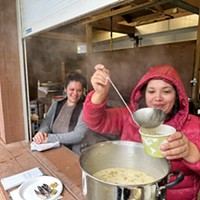Friday, September 13, 2013
'Let's Have Intercourse' - An Etymological Mystery
Posted By Ryan Burns @RyanBurnsy on Fri, Sep 13, 2013 at 4:47 PM
In this week's cover story on the not-so-sleepy town of Loleta, Heidi Walters recalls the town's late-19th century days as a railroad depot known as Swauger's Station. "The townspeople," reports Walters, "changed the name in 1897 to Loleta — a Wiyot term, lo-le-tah, meaning "pleasant place at the end of the water."
Ah, how sweet and idyllic. And indeed, that appears to be the official word on the matter.
But today, a dim memory rose to the surface of our collective Journal-brain: Some years ago, National Geographic published an interactive map of the United States filled with definitions of town names derived from Native American languages. If you click and hover over our region of the map, you see this:
"Let's have intercourse"?! Could this possibly be true?
Well, yes. At least according to Trinidad resident Ellen Golla, who wrote a letter to the editor of the Times-Standard back in 2007 recounting the following tale:
Golla cited as her source the 1970 tome "California Place Names" by the late Edwin G. Gudde, a former professor of linguistics and anthropology at UCLA. We tracked down the citation, and it turns out Gudde's definition has an even more plaintive and explicit tone: "Come on, let's have sexual intercourse." (Emphasis added.)
And here we find another source, "Native American Placenames of the United States" by William Bright, that says essentially the same thing. Both authors identify their source as Karl V. Teeter, a linguist who worked extensively with the last native speaker of the Wiyot language and published a book called "The Wiyot Language" and a two-volume Wiyot Handbook, according to his obituary.
So there you have it, folks. Loleta is not just a town with a cheese factory, a meat market, a bakery and lots of nice folks. It's also a garbled plea for sex.
Ah, how sweet and idyllic. And indeed, that appears to be the official word on the matter.
But today, a dim memory rose to the surface of our collective Journal-brain: Some years ago, National Geographic published an interactive map of the United States filled with definitions of town names derived from Native American languages. If you click and hover over our region of the map, you see this:
"Let's have intercourse"?! Could this possibly be true?
Well, yes. At least according to Trinidad resident Ellen Golla, who wrote a letter to the editor of the Times-Standard back in 2007 recounting the following tale:
In 1893, the residents of what was then known as Swauger's Station decided to change the town's name. Mrs. Rufus F. Herrick consulted a Wiyot elder to find an appropriate indigenous appellation. The Indians actually called it katawólo 't.
A joke was played on Mrs. Herrick. The elderly gentleman told her that it was hó wiwItak. This does not translate as “beautiful place at the end of the river,” but rather “Let's have intercourse!”
She interpreted the last part of the phrase, in baby-talk fashion, as Loleta. And thus she suggested “Loleta” to the residents of the town, which they accepted.
Golla cited as her source the 1970 tome "California Place Names" by the late Edwin G. Gudde, a former professor of linguistics and anthropology at UCLA. We tracked down the citation, and it turns out Gudde's definition has an even more plaintive and explicit tone: "Come on, let's have sexual intercourse." (Emphasis added.)
And here we find another source, "Native American Placenames of the United States" by William Bright, that says essentially the same thing. Both authors identify their source as Karl V. Teeter, a linguist who worked extensively with the last native speaker of the Wiyot language and published a book called "The Wiyot Language" and a two-volume Wiyot Handbook, according to his obituary.
So there you have it, folks. Loleta is not just a town with a cheese factory, a meat market, a bakery and lots of nice folks. It's also a garbled plea for sex.
Speaking of...
-

A Brief History of Dildos
Apr 11, 2024 -

'Our Food is Our Medicine'
Mar 28, 2024 -

Jersey Boys
Jan 11, 2024 - More »
Comments (6)
Showing 1-6 of 6
Readers also liked…
more from the author
-
Unequal Opportunities
Behind the ACLU's allegations of racial, sexual and disability discrimination in local schools
- Jan 2, 2014
-
Last Days of the Surfing DA
Heading into his final year in office, Paul Gallegos talks politics, family and The Smiths
- Jan 2, 2014
-
Systematically Misled
- Dec 26, 2013
- More »


































